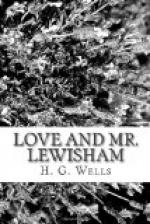When at last they came down the long road into Whortley, the silent trees were black as ink and the moonlight made her face pallid and wonderful, and her eyes shone like stars. She still carried the blackthorn from which most of the blossoms had fallen. The fragrant wallflowers were fragrant still. And far away, softened by the distance, the Whortley band, performing publicly outside the vicarage for the first time that year, was playing with unctuous slowness a sentimental air. I don’t know if the reader remembers it that, favourite melody of the early eighties:—
“Sweet dreamland faces,
passing to and fro, (pum, pum)
Bring back to Mem’ry
days of long ago-o-o-oh,”
was the essence of it, very slow and tender and with an accompaniment of pum, pum. Pathetically cheerful that pum, pum, hopelessly cheerful indeed against the dirge of the air, a dirge accentuated by sporadic vocalisation. But to young people things come differently.
“I love music,” she said.
“So do I,” said he.
They came on down the steepness of West Street. They walked athwart the metallic and leathery tumult of sound into the light cast by the little circle of yellow lamps. Several people saw them and wondered what the boys and girls were coming to nowadays, and one eye-witness even subsequently described their carriage as “brazen.” Mr. Lewisham was wearing his mortarboard cap of office—there was no mistaking him. They passed the Proprietary School and saw a yellow picture framed and glazed, of Mr. Bonover taking duty for his aberrant assistant master. And outside the Frobisher house at last they parted perforce.
“Good-bye,” he said for the third time. “Good-bye, Ethel.”
She hesitated. Then suddenly she darted towards him. He felt her hands upon his shoulders, her lips soft and warm upon his cheek, and before he could take hold of her she had eluded him, and had flitted into the shadow of the house. “Good-bye,” came her sweet, clear voice out of the shadow, and while he yet hesitated an answer, the door opened.
He saw her, black in the doorway, heard some indistinct words, and then the door closed and he was alone in the moonlight, his cheek still glowing from her lips....
So ended Mr. Lewisham’s first day with Love.
CHAPTER VII.
THE RECKONING.
And after the day of Love came the days of Reckoning. Mr. Lewisham. was astonished—overwhelmed almost—by that Reckoning, as it slowly and steadily unfolded itself. The wonderful emotions of Saturday carried him through Sunday, and he made it up with the neglected Schema by assuring it that She was his Inspiration, and that he would work for Her a thousand times better than he could possibly work for himself. That was certainly not true, and indeed he found himself wondering whither the interest had vanished out of his theological examination of Butler’s Analogy. The Frobishers were not at church for either service. He speculated rather anxiously why?




